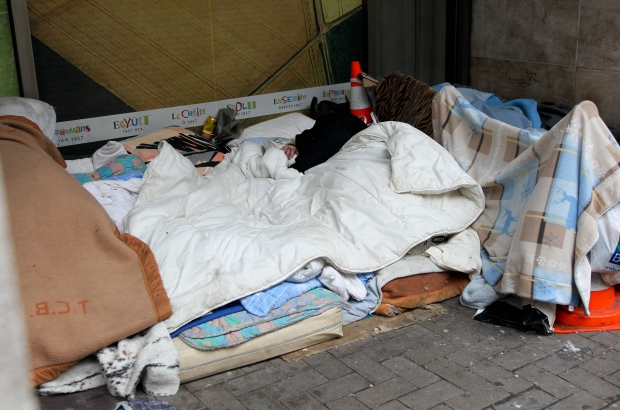- Daily & Weekly newsletters
- Buy & download The Bulletin
- Comment on our articles
Homeless aid organisations brace for difficult winter
Organisations that aid the homeless are worried about the approach of winter, saying that with up to 10,000 vulnerable people in Belgium, the situation is dire.
Operation ORIG-AMI said that with more people living in precarious conditions or on the streets, volunteers have to work extra hard to keep everyone warm.
The non-profit launched in 2016, its name a reference to its initial mission of offering foldable cardboard tents to the homeless, with origami being the Japanese art of paper-folding.
Today this is no longer feasible due to a rise in the price of cardboard, and so the association buys large quantities of traditional tents, cold-weather sleeping bags and insulating mattresses to distribute to the homeless all over Belgium.
“It's an emergency situation,” ORIG-AMI’s Xavier Van der Stappen told RTBF. “It's not something we do all year round. We work in winter with homeless people who really have no choice.”
Last year, the non-profit distributed 2,200 emergency kits containing tents, mattresses and sleeping bags via some 30 partner associations. This year, an initial order for 1,000 kits is nearing completion, and the association is seeking funds to finance a further 1,000 kits, in particular via its website, where people can sponsor a kit for up to €30.
Associations working with Operation ORIG-AMI say this provision of equipment is essential. Homeless people sometimes need several sleeping bags in the space of a few months, either because they become damaged or because they are stolen.
The kits – and homeless aid organisations in general – also help bridge the gap created by a lack of capacity in formal homeless shelters and new rules adopted by some that make it more difficult to secure a space.
“You have to make an appointment a day in advance by phone or online – this is absurd because not all rough sleepers have a phone or internet access,” said Charly Vetro of aid association Cœur SDF.
"If a person who has booked a bed doesn't turn up, the bed remains unoccupied, while the centres are saturated. This is another difficulty on top of the others, since dogs are not allowed, for example, or because when you register, you have to go for seven nights in a row."
Cœur SDF echoed the warning that the homeless population is only growing, saying it is looking for new premises to offer meals to the homeless because the one it has occupied for the past five years, already larger than its predecessor, is no longer sufficient.
“We can say that the number of people who come to our association has doubled in 5 years,” Vetro said. “Not only do we receive isolated people, but also more and more families with very young children. Our youngest beneficiary is not yet a year old.”
Belgium signed the Lisbon Declaration in June 2021, in which it undertook to combat homelessness through structural measures by 2030.
The King Baudouin Foundation has been working with UCLouvain and KULeuven, as well as the Brussels agency Bruss'Help, to obtain accurate data surrounding the number of homeless people in the country since 2020.
Volunteers count the number of people who do not have a home, which can include, among others, those living in emergency accommodations, hostels or shelters, in an institution (under certain conditions), in non-conventional accommodation, with friends, family or third parties (due to lack of accommodation), or under threat of eviction (under certain conditions).
A new count in Brussels mobilised more than 400 volunteers last week, but the results are not expected before June 2025. In 2022, the operation concluded that there were 7,134 homeless people in the capital, an increase of 18.9% compared with 2020.
“We estimate that the number of homeless people is increasing by about 20% every year, and we fear that by 2024 it will be close to 10,000,” said Eva Salman, the Bruss'help communications manager.
Brussels has the largest population of homeless people, followed by the province of Luxembourg (1,394 homeless people), Mons-Borinage (1,337), Namur (1,146), Charleroi (1,159), Tournai (504), Walloon Brabant (888) and La Louvière (524), with the counts ranging from 2021-2023.
Grassroots organisations deplore the lack of awareness on the part of the authorities and regret that they’re being used as a stopgap for a failing system.
“We shouldn't even exist,” said Charly Vetro.
“We're here to make up for the shortcomings of a society that no longer knows what solidarity is – a society where the homeless, alcoholics, drug addicts and the mentally ill are lumped together. This lumping together only serves to frighten people, and we need to do some fundamental work over the long term.”
ORIG-AMI’s Xavier Van der Stappen expressed dismay that homelessness continues to be a growing problem in a country as well off and stable as Belgium.
“We are a relatively wealthy country today, we’re in the 21st century and we are not in a state of war either,” Van der Stappen said.
“But sometimes you get the impression you're dealing with refugee camps. In Brussels, we’re talking about 7,134 people out of a population of one million.
"I think it's entirely realistic to take these people in, even if we know that it's complicated and that there are medical and psychological issues to deal with. It's possible. And as long as it's possible, I think it should be done."



















